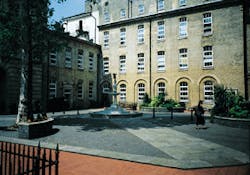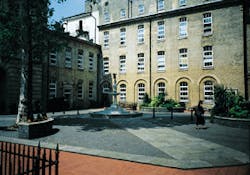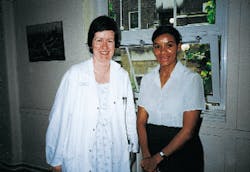Dental hygiene - British style
Barbara Pichette, RDH
England has long borne the brunt of dental jokes. In an episode of The Simpsons, a dentist warns his patient to either take care of his teeth or else he would look like one of the horrifying pictures in the dentist`s "Book of British Smiles." In the movie Austin Powers, Mike Myers 1960s-era British secret agent wears a dreadful set of teeth and flashes a horrendous smile throughout the film in a recurring joke that mocks British dental care. Even one of my patients, an American, once commented that his crooked front teeth were genetic hand-me-downs from his British parents. So on my recent trip to England, I decided to scrutinize the "English smile" by learning more about British dental hygiene. Did the guardian angel of the American smile, the dental hygienist, have a British counterpart? Was the practice of dental hygiene that much different between the two countries?
The profession of dental hygiene, I discovered, is alive and well in the United Kingdom. To better understand the practice of dental hygiene there, I contacted Linda Alexander, administrative secretary at the Eastman Dental Institute for Oral Health Care Sciences at the University of London. Ms. Alexander kindly arranged for me to visit the school of dental hygiene, tour their facility, and meet with some members of the teaching staff. I was hosted by Dr. Elizabeth Watts, the director of the School of Hygiene, and Pam Humphries, a tutor hygienist (or teaching assistant).
Dental hygiene is a relatively young profession in the United Kingdom. Dental hygienists were first trained in an experimental program to care for servicemen during World War II at the Eastman School. After the war, the city of Manchester opened the first formal school for dental hygiene in England, and many other programs followed. All dental hygiene programs are located within dental schools.
Hygiene students work in the school clinic for half a day and then attend school during the rest of the day. Patients receive one-hour appointments with first-year students; second-year students see patients for 45 minutes. (How fondly I remembered the two-hour appointment blocks of my senior year in 1981!) Completing the job, however, may take six or seven visits since students work on one sextant at a time.
The staff and students at the Eastman school stress the importance of proper home care with impressive diligence. A sign on the wall of the waiting room at the Eastman hygiene clinic states, "Please bring your toothbrush with you for all your appointments in the school of dental hygiene." According to Ms. Watts, patients are given a toothbrush at their first visit to the dental school, and they are shown proper brushing and flossing techniques. A bleeding score given to each patient establishes their oral hygiene, and patients with poor scores can be refused further dental services until their home care improves. When I expressed my amazement about their high standards, Ms. Watts commented that private-practice dentists often deny treatment to patients with marginal home care habits.
Eastman dental hygiene students study 22 months to receive a diploma from the Dental Council, then renew their license annually. The British dental hygiene license is valid anywhere in the United Kingdom and in many European countries. The teaching assistants at Eastman, all practicing UK hygienists, were amazed when I told them my license was only valid in one state. I felt almost embarrassed trying to explain our system of one country and 50 licenses.
Much like hygienists in the United States, dental hygienists are in demand in the United Kingdom, as schools struggle to meet the needs of the population. At the Eastman School, during the 1997-1998 school year, 14 dental hygiene students were accepted from 140 applicants. According to Ms. Humphries, hygienists in private practice can earn 20 to 25 pounds per hour, equal to about $32 to $40 at the time of my visit (national health insurance clinics pay less). Dental hygiene provides a respectable income in England. Also, like their American counterparts, very few hygienists in England are men, although Eastman boasted one male student at the time of my visit.
Overall, the duties of the British dental hygienists are similar to those of American hygienists. They can scale, root plane, provide periodontal treatment, polish, apply fluoride, and, with recent changes in practice law, take radiographs. Oddly enough, however, only the dentist is permitted to take impressions, and British dental hygienists and assistants hope to add that as an expanded duty.
A typical visit to the general dentist (called the dental surgeon in England) begins with a scheduled exam with the dentist, who determines a treatment plan before sending the patient to the operatory of the dental hygienist. The visit with the hygienist usually lasts for one-half hour, if the appointment is routine maintenance. Recalls are usually scheduled every three months (or six, if your hygiene is exceptionally good). Dental offices offer toothbrushes and oral hygiene aids for purchase at recall appointments, not as the "freebies" American patients have come to expect.
In the United States, patients schedule their dental "cleaning" or "prophy" appointment with the hygienist. I was curious what the British dental patient called their appointment with the dental hygienist. According to the hygiene tutors, when a patient visits the hygienist in the UK, he receives "hygiene treatment," an improvement in nomenclature over our terms of prophy and cleaning. Few dental patients in the United States understand the term, "prophy." Worse yet, the term, "cleaning" minimizes the importance of the recall visit; if something`s not clean, it`s just dirty, not sick.
The people of England receive national health insurance coverage, which provides the basic services, but pays for only a small portion of crowns, bridges, braces, and cosmetic dental treatment. Private dental insurance is starting to become more popular, and dentists and patients appreciate the expanded coverage. As I traveled throughout England, I could not help but notice how many people had discolored teeth, missing teeth, severe malocclusion - generally "bad teeth." I can only assume dental expectations are much lower in England, where services are not always covered. While many American dental patients expect the dentist (and their insurance company) to create the perfect smile, their British counterparts may be satisfied to just be free of pain.
I truly enjoyed my visit to the Eastman School, and the opportunity to learn how, on the opposite side of the Atlantic, dental hygienists work towards the same goals as hygienists in America. Now, if only I could learn to understand their language.
After touring England, Barbara Pichette, RDH, returned home to Southfield, Mich. She can be contacted at [email protected].
he courtyard at the Eastman dental hygiene school.
Dr. Elizabeth Watts, left, and Linda Alexander


